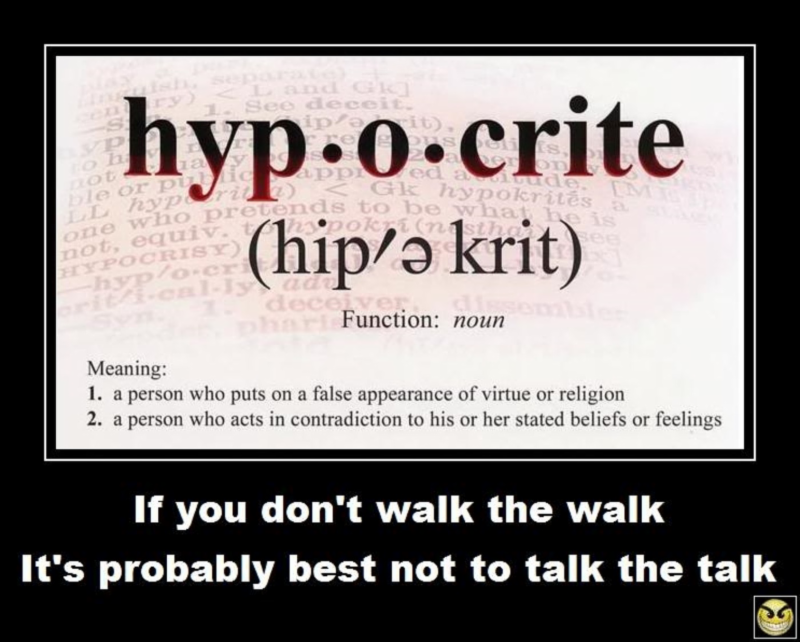Hypocrisy and Fascism
08-12-2018Hypocrisy and Fascism

We live in an age of hypocrisy. For President Trump who both condemns hypocrisy in others and personifies the hypocrite, examples of hypocrisy are legion: The election was rigged, until it wasn't; the swamp must be drained, but filled with swamp creatures; the rich must be pilloried, but also made even richer; he didn't write a memo spinning a meeting with Russians at Trump Tower, but he did; media creates fake news, but Fox News tells the truth. The President dazzles by his imperviousness to consistency. And yet, the charge of hypocrisy seems to do little to damage the President.
As Zach Biondi writes, hypocrisy may not be a problem for the President; instead, hypocrisy is at the very essence of the President's power. Biondi argues that there is a close relation between hypocrisy and incipient fascism and that charging the President with Hypocrisy, therefore, may be a fool's game.
Biondi ties hypocrisy to fascism because "A feature of fascism is its incoherence and internal inconsistency." He asks:"The attitude Trump promotes about the media is nothing if not deeply incoherent. Some outlets are characterized holistically as fake... and yet trusted when the news is advantageous. The hypocrisy is exasperating. Trump supporters engage in doublethink with respect to the media. Arendt captures the phenomenon in a chilling passage:'The whole hierarchical structure of totalitarian movements, from native fellow-travellers to party members, elite formations, the intimate circle around the Leader, and the Leader himself, could be described in terms of a curiously varying mixture of gullibility and cynicism with which each member, depending upon his rank and standing in the movement, is expected to react to the changing lying statements of the leaders and the central unchanging ideological fiction of the movement.A mixture of gullibility and cynicism had been an outstanding characteristic of mob mentality before it became and everyday phenomenon of masses. In an ever-changing, incomprehensible world the masses had reached the point where they would, at the same time, believe everything and nothing, thinking that everything was possible and that nothing was true. The mixture in itself was remarkable enough, because it spelled the end of the illusion that gullibility was a weakness of unsuspecting primitive souls and cynicism the vice of superior and refined minds. Mass propaganda discovered that its audience was ready at all times to believe the worst, no matter how absurd, and did not particularly object to being deceived because it held every statement to be a lie anyhow. The totalitarian mass leaders based their propaganda on the correct psychological assumption that, under such conditions, one could make people believe the most fantastic statements one day, and trust that if the next day they were given irrefutable proof of their falsehood, they would take refuge in cynicism; instead of deserting the leaders who had lied to them, they would protest that they had known all along that the statement was a lie and would admire the leaders for the superior tactical wisdom. (p. 382)"Everything and nothing"-the epitome of incoherence and inconsistency. We fail to understand Trump's weaponizing of "fake news" if we do not notice its incoherence. The term "fake news" is itself incoherent: news, by definition, cannot be fake. Thus fake news exists only by reference to objective reality. The fake is opposed to the real and genuine. By calling news fake, the whole concept of objective reality collapses into polarization. When a leader both does this and denies doing it, and then annihilates and preserves the whole distinction, we get incoherence and a mark of fascism."
"What should we make of these inconsistencies? Liberals typically resort to charges of hypocrisy. Yet calling out hypocrisy assumes that consistency has value, that the Trump GOP cares about acting in accordance with principles, and that, in general, our public discourse should be held together with standards of logical coherence. Yet in point of fact, charges of hypocrisy are doing nothing. The Trump GOP nevertheless persist. Why?We are tempted to think that it is because, deep down, the Trump GOP holds other, more nefarious principles, and their actions are perfectly consistent with those principles. If they would simply be honest and sincere, all of their behavior would become explainable. In short, the worldview is actually coherent and their actions consistent with it. They simply lie about the worldview.We are striving to find consistency and coherence because surely it must be there. Fundamental logical principles require it. Yet our assumptions risk mischaracterizing the reality in a dangerous way.My concern is that the incoherence is not a bug. It is a feature. The inconsistency is becoming an end in itself. This is a sign of a creeping fascism. The charges of hypocrisy fail because what appears like hypocrisy is in fact an integral part of the Trump GOP system of belief. The assumptions in an accusation of hypocrisy are becoming politically nontrivial.As history teaches, charging a fascist with hypocrisy is especially pointless."
Hypocrisy, as Hannah Arendt writes, is based upon the Greek word for "play-actor." The hypocrite "falsely pretends to virtue." He or she "plays a role as consistently as the actor in the play who also must identify himself with his role." What distinguishes the hypocrite is that his or her duplicity "boomerangs back upon himself, and he is no less a victim of his mendacity than those whom he set out to deceive. Psychologically speaking, one may say that the hypocrite is too ambitious; not only does he want to appear virtuous before others, he wants to convince himself." The hypocrite, in convincing himself of his goodness, populates the world with "illusions and lying phantoms" and expunges from the world the incorruptible self, "the only core of integrity from which true appearance could arise again." This is why Arendt calls the hypocrite "rotten to the core" and says of revolutions that they look like "the explosion of an uncorrupted and incorruptible inner core through an outward shell of decay and odorous decrepitude." What revolutionaries promise, above all, is to tear "the mask of hypocrisy off the face" of a corrupt society, to tear "the façade of corruption down" and expose "behind it the unspoiled, honest face of the people." The appeal in truthtelling is that it speaks from the heart; it is founded upon the fear of hypocrisy.
Arendt worries, however, that the "hunt for hypocrites" and the desire to unmask the hypocrite "would leave nothing behind the mask." What those truthtellers and revolutionaries who would unmask the hypocrites forget, Arendt writes, is that all persons appear in public wearing a mask. The word "person" from the Latin "persona" means that which sounds through a mask. The Roman "person" was a citizen, someone granted the public mask of citizenship and thus someone in whom the law sounded through. To appear unmasked is to appear naked, exposed in one's raw humanity-someone reduced to a biological or zoological body without any human qualities. In short, the hunt for hypocrites may not emancipate citizens, but it might reduce all citizens to mere natural humans, shorn of the "protecting mask of a legal personality."
The hunt for hypocrites is a dangerous game, not least because no one can stand to have their private motives exposed to the light of day. Even more dangerous, however, is that the hatred of hypocrisy idealizes a kind of 'natural' person, someone who is "nothing behind the mask." Such a nothing, Arendt argues, may help root out deception, but it also obliterates all truth, insofar as truth too can only sound through a mask. One way to understand President Trump is as the affirmation of modern reality that there is nothing behind the mask. It is just such nihilism that is one of the conditions of the possibility of fascism.
-Roger Berkowitz
Speak For Yourself
 Kwame Anthony Appiah has some really sound advice. Stop speaking "as a..." and speak for yourself.
Kwame Anthony Appiah has some really sound advice. Stop speaking "as a..." and speak for yourself.
Form more information visit: https://www.nytimes.com/2018/08/10/opinion/sunday/speak-for-yourself.html?action=click&pgtype=Homepage&clickSource=story-heading&module=opinion-c-col-right-region®ion=opinion-c-col-right-region&WT.nav=opinion-c-col-right-regionhttps://www.nytimes.com/2018/08/10/opinion/sunday/speak-for-yourself.html?action=click&pgtype=Homepage&clickSource=story-heading&module=opinion-c-col-right-region®ion=opinion-c-col-right-region&WT.nav=opinion-c-col-right-region"As a white man," Joe begins, prefacing an insight, revelation, objection or confirmation he's eager to share - but let's stop him right there. Aside from the fact that he's white, and a man, what's his point? What does it signify when people use this now ubiquitous formula ("As a such-and-such, I ...") to affix an identity to an observation?Typically, it's an assertion of authority: As a member of this or that social group, I have experiences that lend my remarks special weight. The experiences, being representative of that group, might even qualify me to represent that group. Occasionally, the formula is an avowal of humility. It can be both at once. ("As a working-class woman, I'm struggling to understand Virginia Woolf's blithe assumptions of privilege.") The incantation seems indispensable. But it can also be - to use another much-loved formula - problematic....Ever since Donald Trump eked out his surprising electoral victory, political analysts have been looking for people to speak for the supposedly disgruntled white working-class voters who, switching from their former Democratic allegiances, gave Mr. Trump the edge.But about a third of working-class whites voted for Hillary Clinton. Nobody explaining why white working-class voters went for Mr. Trump would be speaking for the millions of white working-class voters who didn't. One person could say that she spoke as a white working-class woman in explaining why she voted for Mrs. Clinton just as truthfully as her sister could make the claim in explaining her support for Mr. Trump - each teeing us up to think about how her class and race might figure into the story. No harm in that. Neither one, however, could accurately claim to speak for the white working class. Neither has an exclusive on being representative.So we might do well to ease up on "as a" - on the urge to underwrite our observations with our identities. "For me," Professor Spivak once tartly remarked, "the question 'Who should speak' is less crucial than 'Who will listen?'"But tell that to Joe, as he takes a sip of kombucha - or is it Pabst Blue Ribbon? All right, Joe, let's hear what you've got to say. The speaking-as-a convention isn't going anywhere; in truth, it often serves a purpose. But here's another phrase you might try on for size: "Speaking for myself..."
Truth and Politics

Form more information visit: https://www.opendemocracy.net/can-europe-make-it/ashoka-amody/recovering-human-dignity-richard-bernstein-on-relevance-of-hannah-arAshoka Mody considers Arendt's thinking about Truth and Politics."A final theme that I take up here is Arendt's passionate advocacy of public spaces for dialogue. In this, her views were shaped by her narrow escape from totalitarianism. For that reason, perhaps, she was deeply concerned about the fragility of democracy.In one of her most famous essays, "Truth and Politics," she opened with a dramatic statement: "Truth and politics are on rather bad terms with each other, and no one, as far as I know, has ever counted truthfulness among the political virtues." She emphasized that not just the demagogue but even the statesman regards lies as "justifiable tools" of the trade. As a result, "The chances of factual truth surviving the onslaught of power are very slim indeed; not only for a time but, potentially, forever." She asked, poignantly and rhetorically, "What kind of reality does truth possess if it is powerless in the public realm?"For Arendt, the antagonism between truth and politics always lies latent in public discourse. If facts "oppose a given group's profit or pleasure," it is all too easy to disdain the facts or regard them with "hostility." Even well-established facts can be dismissed as merely "opinions." Skilled politicians can exploit "rhetorical" devices to promote their favored opinion and thus garner ever-larger numbers of supporters. "Mass manipulation of fact and opinion" then lead to "rewriting of history" and "image-making," a phenomenon that the cognitive linguist George Lakoff would call "framing." In psychologist Irving Janis's terminology, discourse and decision-making fall under the spell of "groupthink."This antagonism between truth and politics, Arendt warned, can degenerate into tyranny. Truth, she explained, is "hated by tyrants." To oppose the "infuriating stubbornness" - indeed, the "coercive power" - of truth, authoritarian rulers hold on to their power by propagating "plain lies."The echoes into the present are all too evident. Lies are justified as plausible opinions, "alternative facts," by authoritarian populists and by their followers who are in search of saviors to better their lot. Donald Trump's ascent to the American presidency and his hold on a core group of supporters fits the pattern exactly. In India, Prime Minister Narendra Modi has placed Mahatma Gandhi on a pedestal while his supporters engage in wanton violence against Muslims and other minorities. Modi's surrogates continue to portray his demonetization initiative - which outlawed bank notes worth 500 rupees or more - as a great success, while all evidence points to severe human and economic distress with little gain in rooting out ill-gotten wealth held in cash.Because her analysis led her to this inherent conflict between truth and politics, Arendt was deeply suspicious of large nation-states, in which, she feared, authoritarian leaders could manipulate facts to sway large numbers of people. Seeking to "recover the dignity of politics," Bernstein writes, Arendt was guided by the same vision that led her to advocate "local Arab-Jewish councils organized in a federated state.""
